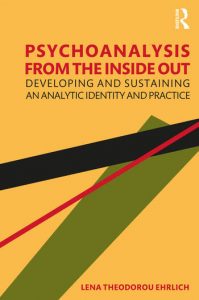Psychoanalysis from the Inside Out: Developing and Sustaining an Analytic Identity and Practice by Lena Ehrlich, London and New York, Routledge, 2020, 169 pp.
Review by Sarah Ackerman, PhD
In lieu of an abstract, here is a brief excerpt of the content:

Lena Ehrlich’s book, Psychoanalysis from the Inside Out: Developing and Sustaining an Analytic Identity and Practice, should be read by every person who aspires to have a robust analytic practice. However, readers may not want to read it at bedtime – for me, it had the power to disrupt my sleep!
In this book, Ehrlich turns a psychoanalytic eye on the practising analyst. She carefully and thoughtfully draws out innumerable internal resistances on the analyst’s part to the practice of analysis, illuminating resistances to recommending analysis, resistances to deepening analysis and broader resistances to sustaining an analytic practice. In the process, she forcefully addresses our own role in diminishing the practice of psychoanalysis, highlighting our conflicting swings between idealizing analysis and devaluing it. As Ehrlich insists, “If we’re to do justice to the complexity of our work as analysts, we have no resting place regarding understanding our motivations. As soon as we’ve identified our reluctance to analyze, we need to question our analytic zeal” (87).
Ehrlich opens the book with an examination of the analyst’s reluctance to offer analysis, unearthing the way in which behind the allure of training to be an analyst lies a hidden fear, and at times even a repulsion, of the messy affects that psychoanalysis stirs in both the analyst and her analysand. Ehrlich shrugs off the external rationalizations as to why psychoanalysis is less commonly practised, even by trained analysts. Instead, Ehrlich looks inward, to consider the analyst’s counter-resistances, her ambivalence and even her unconscious hatred of analysis. This is where the ground may tremble under a reader’s feet: Ehrlich proposes that trained analysts frequently eschew the recommendation of analysis even on occasions when their training affirms its appropriateness. Through clinical vignettes, she displays an array of emotional vectors that underlie her own reluctance to analyse. Ehrlich makes no mention of Morris’ (2016) paper, “The Analyst’s Offer”, which articulates the enigmatic messages inherent in the recommendation of analysis and the impact on the patient of this inevitably seductive message. And yet it is clear that Ehrlich is well aware that the recommendation is opening up a Pandora’s box. Indeed, part of her effort is to challenge analysts to come to the conversation ready for the emotional upheaval that any good analysis invites for both parties. “Based on my own experience recommending analysis, I concur with the view that the recommendation for analysis is from the outset infused with realistic and infantile wishes and fears from both therapeutic partners”<…>
The International Journal of Psychoanalysis, 102(4): 822-826, August 2021.
Link to Online Publication [fulltext can be requested from the library]. The book is available on loan from the library to members and partners.
About the Author

Sarah Ackerman, PhD, is a Training and Supervising Analyst at the Boston Psychoanalytic Society and Institute, co-chair of the Psychoanalysis Study Group sponsored by the Leslie Center for the Humanities at Dartmouth College, and Adjunct Faculty in the Department of Psychiatry at the Geisel School of Medicine at Dartmouth College. She maintains a private practice in Hanover, New Hampshire. She is the author of many articles, including recently published A Diagnosis for Psychoanalysis in the 21st Century: Freud as Medicine, “I May Allow Myself to do This”: Conflict in Freud’s Writing of The Interpretation of Dreams, (How) Can We Write about Our Patients?, and Impossible Ethics.
Previous Posts:
Lewis Kirshner, MD (2020). Trauma by Lucy Bond and Stef Craps. London: New Critical Idiom, Routledge, 2019, 173 pp. American Imago, 77(4), 800-808.
Cuneyt Iscan, MD (2021). Large-Group Psychology: Racism, Societal Divisions, Narcissistic Leaders, and Who We Are Now, by Vamik D. Volkan, Phoenix Publishing House Ltd, Oxfordshire, UK, 2020, 139 pp. American Journal of Psychoanalysis, 81: 244–248.
José Saporta, MD (2021). Psychoanalysis and Our Cultural Crisis. Subject, Action, & Society: Psychoanalytical Studies and Practices, 1(1): 91-109.
Elsa Ronningstam, PhD, Mark Goldblatt, MD, Mark Schechter, MD, Benjamin Herbstman, MD (2021). Facing a patient’s suicide—The impact on therapists’ personal and professional identity. Practice Innovations, 6(2), 89–106.
Anton O. Kris, MD (2021). Love Is the Great Educator: Response to Richard Frank and Mel Bornstein. Psychoanalytic Inquiry, 41(4-5), 289-291.
Alex Hoffer, MD (2020). Psychoanalysis as a Two-Person Meditation: Free Association, Meditation, and Bion. The American Journal of Psychoanalysis, 80(3): 331–341.
Nancy J. Chodorow, PhD. (2021). Women Mothers Daughters: The Reproduction of Mothering After Forty Years. In Bueskens, P., ed. Nancy Chodorow and The Reproduction of Mothering: Forty Years On. Palgrave, pp. 49-80.
Anthony D. Bram, PhD. (2021). Introduction – In-Session Use of Digital Material in Child Psychoanalysis and Psychotherapy. The Psychoanalytic Study of the Child, 74(1): 304-307.
Steven H. Cooper, PhD. (2021). Toward an Ethic of Play in Psychoanalysis. The Psychoanalytic Quarterly, 90:3, 373-397.
Diane O’Donoghue, PhD. (2021). Amnesias of a Freudian Kind. Part One. American Imago 78(1), 55-77.
Charles Levin, PhD and Dawn Skorczewski, PhD. (2020).The Poetics of Boundary Violation: Anne Sexton and Her Psychiatrist. Psychoanalytic Dialogues, 30(2), 206-221.
Andrea Celenza, PhD (2020). Embodiment and the Perversion of Desire. The Psychoanalytic Quarterly, 89(3), 369-398.
Steven H. Cooper, PhD (2021). Donald Winnicott and Stephen Mitchell’s Developmental Tilt Hypothesis Reconsidered. Psychoanalytic Dialogues, 31(3), 355-370.
Elsa Ronningstam, PhD (2021). Cultural Function and Psychological Transformation of Silence in Psychoanalysis and Psychotherapy. In Dimitrijevic, A. and Buchholz, M.B., eds. (2021). Silence and Silencing in Psychoanalysis: Cultural, Clinical, and Research Perspectives. Routledge, pp. 105-127.
Paola M. Contreras, PsyD (2021). The Magical and the My-Person in Psychoanalysis During the Covid Pandemic. Journal of the American Psychoanalytic Association, 68(6): 1113-1126. Open Access, DOI: 10.1177/0003065120981733
Click here to see a full archive of featured papers. All articles can be requested from the library.

